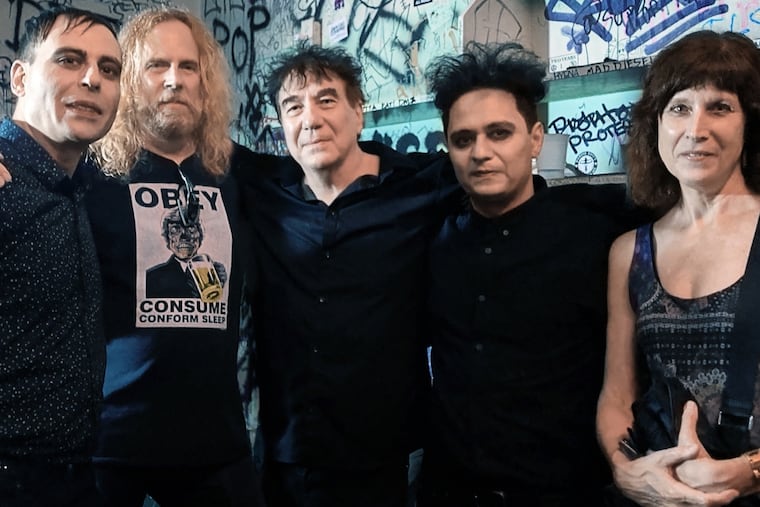Dave Heckman, music entrepreneur and founder and president of Metropolis Records, has died at 68
He and his wife also opened the music store Digital Underground in 1991. "Going into the music business was the best thing that ever happened to me," he said.

Dave Heckman, 68, of Philadelphia, an electronic, industrial and darkwave music entrepreneur who owned the music store Digital Underground, and the founder and president of Metropolis Records, died Friday, July 29, of cardiac arrest at Pennsylvania Hospital.
Although he did not play an instrument or sing himself, Mr. Heckman had a love and an ear for independent music, and his determination and skill as an entrepreneur led him to open Digital Underground on Fifth Street between South and Lombard Streets in 1991, and found Metropolis Records in 1993 in the back of the store and basement of his home.
He went on to expand Metropolis to include 12 full-time employees, a distribution warehouse in Essington, and nearly 1,300 releases. He acquired the catalogs of several other labels, and represented more than 200 artists from around the world, including bands such as Belgium’s Front 242, Canada’s Front Line Assembly, Germany’s KMFDM, and England’s Bauhaus.
“I’m proudest about taking small bands that sell 1,000 copies and turning them into a band that sells 30,000 to 50,000,” he told artdesigncafe.com in 2010.
By 2000, Metropolis had become North America’s most notable distributor of electronic, darkwave, and industrial music and art, and world-wide consumers credited Mr. Heckman with providing music they often found hard to find.
“Metropolis made it possible to walk into a small record store on the other side of the planet and find the music you needed to hear,” a fan wrote in an online tribute. Another said: “Dave, we never met, but you really helped young me find an identity.”
Music writers called his impact “unparalleled” and his achievements “staggering.” He was hailed as “one of Philadelphia’s paragons of independent music and an avatar of the darkwave/electronic scene” by A.D. Amorosi in Dosage magazine, and Gail DeLong, his wife and business partner, said: “He was way ahead of the curve.”
In a 2008 interview with Igloo magazine, Mr. Heckman said the quality of music he distributed was just as important as the quantity of sales. “We’ve obviously put out a lot of releases,” he said. “But it’s just things that hit me, something that has to move me.”
Some of his artists called him a “mentor,” “generous,” “friendly,” and “one of the few people in this business you could always count on.” In 2012, he told idieyoudie.com, “I run my label like a business. Other people run it like a hobby.”
Mr. Heckman and DeLong opened Digital Underground for those they perceived as Philadelphia’s underserved consumers of independent music. They vied for business with Tower Records and other stores, added a mail-order sales component in 1992, and sold it in 2000 after moving to San Francisco.
Last year, as he looked back on the ever-changing nature of the music business and Metropolis’ nearly three decades of existence, he told side-line.com: “We will continue to do what we do and improve where we can, remembering that adapting to change is important.”
Born May 7, 1954, in Allentown, Mr. Heckman graduated from Louis E. Dieruff High School in 1972 and Pennsylvania State University in 1978. At first, he worked jobs in which he learned the intricacies of product demand and distribution, and earned a master’s degree in business administration at Temple University.
He liked the sounds of Roxy Music, David Bowie, Sparks, and Kraftwerk, and honed his musical ear in the 1980s at local venues such as the Hot Club, East Side Club, Kennel Club, and Revival. He met DeLong, an engineering student, at Penn State, and they married in 1981, and had son Colin and daughter Nina.
They lived near the Art Museum, in Southwest Center City, Bella Vista, and Langhorne before moving to San Francisco in 1998. They returned to Philadelphia in 2014.
Mr. Heckman championed many liberal causes as a young man, and DeLong was attracted to him from the start. “He introduced me to his music and art,” she said. “We were different kinds of people. But it worked. He was interesting and intelligent and was always out to help the underdog.”
Vocalist Athan Maroulis said Mr. Heckman looked out for his artists like they were his family, handling the complex business-side details so they could focus on the music. “He consistently elevated those around him,” Maroulis said. “I will always be indebted to him.”
In addition to his wife and children, Mr. Heckman is survived by two brothers and other relatives.
A celebration of his life is to be held later.
Donations in his name may be made to MindLeaps, 116 West 23rd Street, Suite 500, New York, N.Y. 10011.